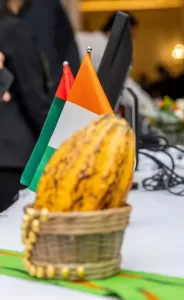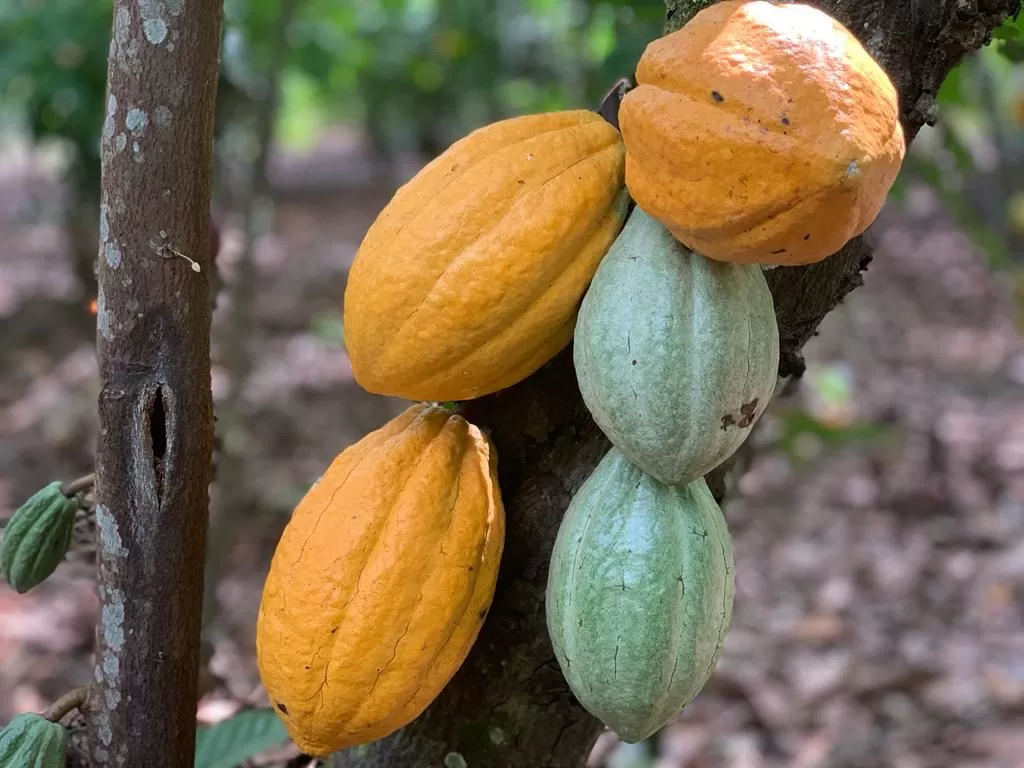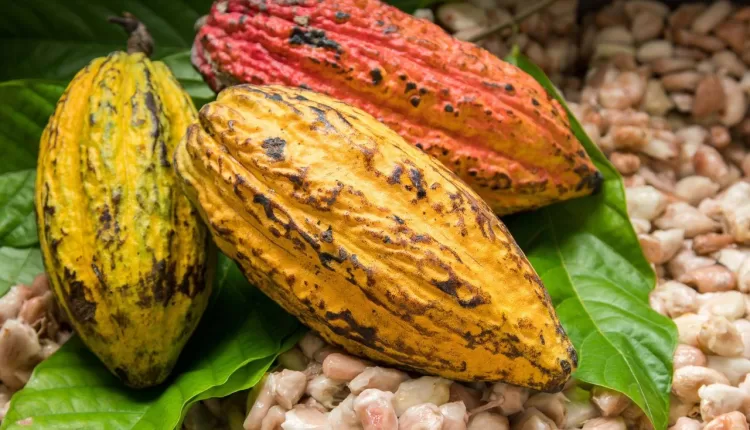This year, 2024, we are heading towards two major events in the cocoa sector, which will take stock of what has been achieved and what remains to be done to deliver sustainable cocoa at scale. The World Cocoa Foundation (WCF) Partnership Meeting organised by the chocolate industry (brands and processors) in Amsterdam, and the World Cocoa Conference organised by the ICCO in Brussels, whose members are governments from importing and exporting cocoa countries. These two events will bring together all the stakeholders in the cocoa value chain to hasten the pace and identify solutions for a sustainable cocoa sector.
Two years ago, we were forced to boycott the 2022 WCF Partnership Meeting due to the cocoa and chocolate industry not following through on its commitments to support Côte d’Ivoire and Ghana’s efforts to bring meaningful change to the livelihoods of cocoa farmers. Two years on, changing the fortunes of millions of cocoa farmers remains a clear target and at the heart of our expectations.
Sustainable cocoa should come from farmers earning a living income.
Ahead of these meetings, as the Côte d’Ivoire Ghana Cocoa Initiative (CIGCI), it is our responsibility to tell some inconvenient truths about sustainable cocoa and call for a quantum leap in the approach to sustainability.
This quantum leap can be summarised in one sentence. Sustainable cocoa should come from farmers earning a living income.
We can’t talk about sustainable cocoa without paying farmers more. Business as usual is no longer an option.
Wealth in the cocoa sector has been for too long concentrated in the downstream part of the supply chain, with retailers, manufacturers, and processors earning billions each year. Chocolate is profitable; cocoa much less. In the meantime, global market demand is changing, and most developed countries are requesting high-value products imported to their countries. A new trend is also building up – demand for sustainable products. Demand-side regulation on sustainable production in global supply chains has been on the rise, with the EU recently putting in place regulations on deforestation-free production and due diligence in global supply chains for commodities, including cocoa.
The vision of the Heads of State of our two member countries is to help make a difference in the lives of smallholder farmers, and we as CIGCI are working hard to bring back price and income into the sustainability equation. The greatest impact on sustainable cocoa production will only come from paying farmers more equitably.
As of today, price and the farmer’s income are forgotten in most sustainability programs and policies. The good news is that the economic dimension of sustainability is now being recognised as the missing piece in the sustainability pillars.
A living income target is slowly emerging as the new frontier of the cocoa industry. It has been a battle led by CIGCI over the past two years, and we are pleased to see that this fact is now being accepted by the major stakeholders. Within a few months, sourcing cocoa that encroaches on forests and breaches human rights will be impossible in the major markets such as the EU or the US. The bad news is that the economic pillar of sustainability is still in its infancy. Should we be satisfied with environmental and social ambitions and give up what is at the heart of the value chain: the farmer and his income?
Since I took the position as the first Executive Secretary of CIGCI which was established in 2019 by the Heads of State of the two countries – that together make up more than 60% of global cocoa production – I have been determined to build the case for a decent price for farmers as a precondition for sustainability. It is unimaginable that out of a 130-billion-dollar chocolate industry, all producing countries – not just Côte d’Ivoire and Ghana – still receive a mere 6% of the value chain, when the equation should be rather simple: There is no chocolate without cocoa and no cocoa, without farmers making a living out of their farming.
Claims of “sustainable sourcing” do not correspond to the reality of farmers on the ground.
Claims of “sustainable sourcing” do not correspond to the reality of farmers on the ground. Despite their commitment to living income as part of their participation in the different National Initiatives for Sustainable Cocoa (ISCOs) in Europe, most companies have not made a public and concrete commitment to date for farmers in their sustainability program to reach a living income. When targeting living income, the outreach and size of voluntary sustainability programs are disproportionally small when compared to living income gaps. And the premiums paid by companies are way too low to significantly impact income. The procurement price is the blind spot of voluntary sustainability programs – buying cheap remains the rule.
Producing sustainable cocoa comes with costs. Avoiding deforestation, child labour, and ensuring a living income for farmers: all this cannot happen “all else equal”—and at unchanged prices and price mechanisms. Let’s not be naïve. The market economy rewards the strongest and punishes the weakest. It is my duty to warn of an unintended consequence of the environmental and social measures taken today in importing countries: it is that the cost of these measures ultimately falls on the weakest link in the chain. The farmer.

Sustainable cocoa production costs are not reflected in terminal market prices. Current price definition mechanisms are not able to honour the social and environmental commitments made by major market players, and it is not a secret that exporting countries base farmgate prices on market prices. These terminal market prices are set on supply and demand fundamentals. But today, the world is changing.
The solution can only be collective. How do we put an end to these inconvenient truths and place farmers on a living income path? Côte d’Ivoire and Ghana have shown that they can instill transformative changes at the heart of the market mechanisms and propel action throughout the chain. This is what they did in 2019 by creating the living income differential (LID), a top-up of USD 400 on every tonne exported from Côte d’Ivoire and Ghana, for the benefit of farmers. We have learned a lot since then. We are taking stock of what has been achieved and what could not be achieved. The LID was a step in the right direction. It is time to make another step now—we, the origins, and all the willing actors in the cocoa value chains.
The new market demand for sustainability is welcome – yet it is adding several complexities and costs, with no clear sharing rule among stakeholders. Côte d’Ivoire and Ghana have taken already the steps to ensure national traceability. They have developed the African Regional Standard for Sustainable Cocoa (ARS). New environmental regulations are being set up in importing countries (e.g Europe, UK and USA, and many other countries). Our collective responsibility is to ensure that the bill for all these sustainability efforts is not passed on to the farmer.

Ensuring that “sustainability” is intrinsically linked to “living income” is the best endeavour we can make to avoid this pass-through and protect the farmer. This happy wedding between two concepts that looked at each other without daring to speak will have profound implications for business and countries’ strategies and policies. It will affect, in the short term, the price mechanisms so as to ringfence the farmer from the irrational exuberance of the market. This means “commoditizing” cocoa and pricing it not on the basis of algorithms but on its true value.
It is with such ambitions, in July 2022, we called all willing stakeholders to sign a letter of intent for the creation of an Economic Pact, to rebalance the governance of the cocoa sector and ensure a decent economic return to farmers while safeguarding the environment and communities.
We are approaching a tipping point. On the eve of the WCF partnership meeting and the World Cocoa Conference, the ancient world of cocoa is cracking but still resisting change, and the new world of cocoa—sustainable cocoa ensuring a living income for all farmers—is about to be born without quite getting there yet.
The cocoa ecosystem is complex, and like any complex system, when you are approaching a tipping point, you often see chaotic behaviour in the system that is getting ready to re-organise. There is pushback from some players, short-termism, and irrational expectations.
But there are also frontrunners and determined actors who are striving to make this Cocoa 2.0 world happen now.
I am calling on frontrunners to assert with us that to be “sustainable,” cocoa should be produced by farmers earning a living income. And to walk the talk in their operations. It is as simple as that. Words matter, but actions matter more. We are not talking about entering the Forbes list or purchasing a Cadillac. We are talking about people’s livelihoods. It is the least that “sustainability” deserves, and our farmers too.
- Sustainable Cocoa Should Come from Farmers Earning a Living Income - February 5, 2024

